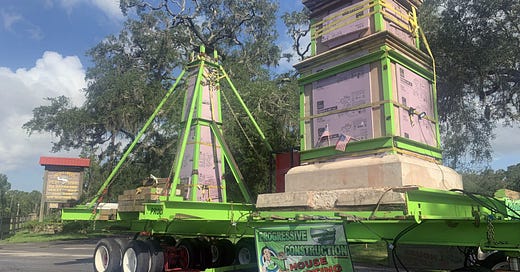The first of nine Army bases named in honor of Confederate military leaders is about to get a new name. In Virginia, Fort Pickett—named in honor of Confederate Major General George E. Pickett of “Pickett’s Charge” fame—will be renamed Fort Barfoot.
This comes after The Naming Commission’s recommendation that the names be changed and is part of a much larger review of military assets that commemorate the Confederacy. Beyond the military, communities across the country will continue to review and discuss ways to bring their own public spaces more in line with the current values of their respective communities.
It’s a process that I largely support and one that is both necessary and often times painful, but often I think people mistakenly conflate the question of whether a building or street name should be changed or whether a monument should remain or be removed with having come to terms with history.
There is a sense that watching a monument roll away on a flatbed truck is tantamount to understanding history.
It’s not.
The study of history and questions of who or what should be celebrated or commemorated are, in my mind, two distinct forms of inquiry. The latter asks something important about who we take ourselves to be as members of our respective communities. What values do we claim to stand for and hope to pass down to the next generation?
The former often involves doing our best to place our own sense of self to the side in order to approach and acknowledge the complexity of the past. Of course, that “noble dream” of objective history is always just out of our reach precisely because so much about how we do history depends on the kinds of questions we ask, what we acknowledge as evidence, etc.
That said, there is a richness and depth of understanding that is possible only when we slow down and are not so quick to judge the past. I wish there was more of this in our current climate and specifically in those spaces where discussions and debates about memory and commemoration are taking place.
Removing a statue because it honors a Confederate soldier or officer may be justified for the community in question, but simply recognizing that he wore a gray uniform gets us no closer to understanding who he was as an individual. Same can be said for the generic soldier statues that have come down across the country over the past few years.
I’ve been thinking a lot lately about one Confederate from Spartanburg, South Carolina, whose wartime and postwar letters I am editing for publication. Captain John Christopher Winsmith was a “diehard Confederate” throughout the war.
His letters are filled with vile hatred for the “Yankee invaders” right up to his wounding outside of Richmond in September 1864. Though the reasons for his change of heart are unclear, Winsmith joined the Republican Party after the war and was a vocal supporter of Black civil rights. His family was attacked by the Ku Klux Klan in 1870. The last letter he wrote before his untimely death was to the abolitionist William Lloyd Garrison.
Winsmith was most certainly exceptional in this regard, but there is a larger point to make.
Individual lives are complex both at a specific moments in time and especially over time. Each of us struggle to make decisions and come to terms with decisions that have already been made. We are pulled and influenced in ways that hover between the rational and irrational. There is no transparent access to the self.
The point is not to excuse the actions of historical actors. Far from it. In fact, part of my point today is that we have a responsibility to interrogate the past much more closely, but that we do so with an appreciation that those who came before us are just as complex and whose lives are just as rich and often just as confusing as our own.
Reminder: I will be sending out invitations via email to all paid subscribers to take part in our first Book Group meeting this Sunday at 7pm. You can decide if you would like to join us. We will be discussing Clint Smith’s book, How the Word is Passed.
Make sure you check out the link to this site’s Chat page. You can download the app for your phone or on your desktop. I’ve been posting items fairly regularly. Paid subscribers can post their own links and commentary. All I ask is that your posts are loosely related to the subject of this site. Thank you.





I agree that we owe a debt to examine the past. Ancient history, modern history, and our own. If we don’t do that work honestly and with an eye for making needed changes, moving forward with integrity is hard.
I will always struggle with any confederate monument on courthouse lawns. Just bad juxtaposition.
I was happy to hear the new name for an ill-advised installation. Fort Barfoot is a great improvement imo! I hope this ideal moves forward.
I agree with your point that really understanding history takes time and a lot of thought. As I do more reading on various historical topics, my understanding of the past is slowly (sometimes very slowly) becoming more clear. It also makes me realize how much more there is to understand. I only wish I had started on this when I was younger. I can only hope to live long enough to read and understand more.